- Home
- Chris Ryan
Hit List Page 19
Hit List Read online
Page 19
Reality came stamping home. He was in the boot of a car, the car was on the move, and his vomit-smeared head was rolling around inside a plastic carrier-bag.
There had been a third man.
He must have come with Branca. Stayed downstairs, perhaps, to pay a taxi-driver. Followed with baggage. And unlike Branca, he must have noticed that the bodyguards were not where they should have been, armed himself, summed up the situation at a glance.
Well, thought Slater wretchedly, this was certainly an impressive debut. Given a chance to distinguish himself he’d fucked up royally. It wasn’t good enough to blame the comms – in truth, he had barely been in control of the situation before Branca’s arrival. He had had the gun, but Fanon-Khayat had had the psychological advantage. Guessing that Slater had been ordered not to leave the apartment without the disc, he had decided to call his bluff. And had Branca not shown up . . .
The floor bucked as the car went over the edge of a pavement, and Slater retched again. His eyes were burning as if rubbed raw with sandpaper and he realised that as well as coshing him they’d taken the Mace from his briefcase and given him a liberal blast of that too. Just after cutting themselves out of the plasticuffs, Slater guessed. The ones that were cutting into his wrists and ankles so painfully had come straight off Suet-Face and Potato-Head.
I should have shot Fanon-Khayat straight away, thought Slater miserably. I should have put one through his ear or taken off a finger or something to get him going, like I did with that Serb. And if he hadn’t produced the disc after that, well, I should have just wasted him and got the fuck out.
The trouble was, he hadn’t looked like the sort of guy you shot. In the past, all those against whom Slater had waged war had been young men – tough and motivated volunteers who knew the score and who could reasonably be expected to survive a bit of rough treatment. Torturing middle-aged art-collectors was very much a new departure for Slater, whatever their political sympathies, and he’d held back.
Even though they weren’t expecting her to be arriving in Paris, both support teams would have identified Branca Nikolic on sight. They would have tried desperately to get through. If he could contact them, they would have reasoned, then they could contact him. And when they couldn’t, they must have thought that he’d switched off – that he’d deliberately broken contact.
And now what? A deserted patch of woodland somewhere outside the city and a bullet through the head, probably. They would use his silenced Sig Sauer – a much sweeter and lighter piece of kit than that Cold War junk they all carried about. They were probably arguing right now about who got to keep it. And who got the Motorola.
Would Fanon-Khayat and the Serbs question him before killing him? Slater wondered. Unlikely – there were no useful answers he could give them. They knew where he came from, they knew what he wanted, they knew what he’d been trying to do. If they were not going to look like a bunch of complete pussies, they had to kill him. That would bring M16 to the negotiating table fast enough.
They were in traffic now, Slater realised. And every jerked start and bad-tempered foot-brake stop was red-hot agony. Someone – probably the now single-thumbed Suet-Face – had given him the mother and father of kickings in the bollocks. Fuck, he was in a bad way.
Was there any hope of pulling out of this? Precious little. Would the team have got on to him? Were they behind him now, tailing this very car? Unlikely. These people weren’t stupid. They’d have known he had back-up and have taken evasive action.
So, what to do? Struggle, or go gently? Thrash pathetically around in his handcuffs and get another kicking for his pains? Or bow his head to the bullet, soldier to soldier?
Slater considered the quick 9mm round through the cerebellum. At that moment there seemed no point in continuing to fight. The vehicle swung through a pothole, sending red-hot needles coursing through his bruised neck and testicles.
Who would miss him or notice that he was gone? He couldn’t come up with a single name. He struggled to remember his mother, but could barely recall the creased photographic image that he had carried around for so many years. She had been hit by a police-car in Hong Kong and had died the next day in the colony’s military hospital. Slater had been five at the time – rising six – and hoping for a bicycle for his birthday.
His distraught father had remained in the army until his alcoholism became as apparent to his seniors as it was to his fellow-NCOs, and thereafter found employment as a nightwatchman in Aldershot. Bill Slater had died of pneumonia at sixty, while Slater was serving in Belize, but in truth Neil had started to lose his father on that never-to-be-forgotten day in Hong Kong. His sixth birthday had come and gone uncelebrated – the bicycle was not mentioned again – and a year later Slater had been dispatched to a boarding school outside Trowbridge in Somerset. His classroom work had been undistinguished – mild dyslexia had seen to that – but on the rugby field he’d proved one of the best fly-halves the school had ever known. He’d enjoyed the place, all in all, with its friendships and conspiracies, and unlike the other pupils had never looked forward to the holidays, which had been spent with his mother’s unmarried sister Amy near Bedford.
Amy was unlikely to have been impressed by the way he had turned out. She had taken him into her house out of a sense of family duty rather than any fondness for children, and her relief when term-time came round again had been obvious. Amy had notably lacked her younger sister’s sense of fun and adventure, but she had taught him one invaluable skill: how to iron and fold a shirt to a professional laundry standard. This facility would earn Slater valuable beer-money in the five years that he spent with the Royal Engineers. The Engineers had been his father’s regiment, and joining up – Slater had never seriously considered any other career – had been like coming home. He was flagged almost immediately as an exceptional soldier. Selection for the SAS had followed shortly after he was made up to corporal.
Schools and regiments were ultimately the same though, thought Slater. People came and people went. You were there for a time and then you moved on, and in personal terms you ceased to exist. Other boys, looking much like you, sat at the desk where you had sat. Other soldiers, looking much like you, trained where you had trained. No one was different enough to make a mark. Your name was typed on a list, pinned to a board, placed in a file, and forgotten.
It occurred to Slater as the vehicle plunged into yet another furrow — another red-hot knife in the neck and the balls – that he was about to die for his country, and for the first time since recovering consciousness the ghost of a smile touched his lips. Hooking the thumbs of his plasticuffed hands into the back of his belt, he attempted to brace himself against the jolting of the car, which was getting worse. They had been driving for over an hour, he guessed, and had moved from main roads to local lanes. They were probably in the countryside now — the going certainly felt uneven enough.
His thumbs found the knife Chris had given him. They had searched him, but they hadn’t found it. He’d forgotten about it himself.
No, he begged the trained part of himself – the part that had been, and always would be, an SAS soldier. Please no. Don’t order me to go on fighting.
You’re not dead, a quiet voice whispered, until you’re dead. This is what it’s about. This is what separates the wolves from the sheep. This is the moment that your entire life has led up to. Fight.
Please. Let me close my eyes. Let me die.
Open your eyes. Whatever the odds, whatever the pain. Fight.
Another horrendous jolt, banging Slater’s cheekbone hard into his own blood, tears and vomit.
Agonisedly, inch by inch, he fingered the sliver of compound plastic from his belt, pushed it down his left sleeve, fitted it under his watchstrap.
It was laughable, no defence against anything or any one, let alone a team of heavily armed and quite possibly sadistic RDB enforcers – but when all was said and done it was a weapon.
When daylight suddenly and violently flo
oded the car-boot, Slater guessed that they had covered about 100 miles. He had been unconscious, he guessed, for about twenty minutes. The bag was pulled from his face and he blinked painfully – his eyes and sinuses were still acutely tender from being blasted with Mace.
As his vision cleared he saw one of Fanon-Khayat’s bodyguards – Potato-Head – reaching for him. Noted the gold-plated identity bracelet on the hairy wrist.
Distaste showed on the Serb’s face at the vomit and blood-smeared features before him. Gripping Slater by the lapels of his jacket, he wrenched him from the car and pushed him to the ground.
They were in a farmyard, Slater saw blearily, and he was lying on a grass verge that had been churned up by cattle and had then dried hard and uneven. The land surrounding them was hilly and sparsely wooded, and there was no sign that they were overlooked from any direction. Certainly there was no other dwelling-place of any kind in sight. The car he had travelled in was a metallic olive Audi Quattro, new-looking. The day was hot and cloudless.
The farm itself was in a poor state of repair. Thistles and tall grass grew through the cracks in the yard’s concrete floor, and the brick outbuildings were badly dilapidated. Beyond the yard several dozen young pigs intermittently squealed and jostled in a makeshift pen. On a rutted track beyond them a tractor and trailer were parked. Two cabbage white butterflies tumbled around each other in a looping aerial ballet. There was the hum of bees. It was a drowsy and peaceful scene.
Not for long. From the front seat of the Audi climbed Suet-Face, a bloody dressing round the stump of his thumb, and a third man, as pasty-faced and heavy-set as the first two. This, Slater guessed, was the guy who had bumped him in the apartment. The two spoke together, Suet-Face spat on the ground and took a half-bottle of spirits from his pocket, and they stared at him, amused.
Slater was not encouraged. None of the trio had the look of a man who intended to be merciful. With his bound hands he felt for the knife. It was still there.
‘Music?’ Suet-Face asked Slater, swigging from the bottle and reaching inside the car. ‘You like?’
Without warning the quiet of the farmyard was shattered by the ear-splitting thump of a techno beat, on top of which a woman’s voice began to screech a coarsely amplified ethnic folk-song. It was, thought Slater as he turned his head away, a truly hideous sound, and the Audi’s top-of-the-range hi-fi did it full justice.
‘You like?’ shouted Suet-Face, tipping back the bottle again. ‘Is Ceca Raznatovich.’
‘Is shit,’ Slater shouted back. ‘Ceca fucks pigs. So does your mother.’
Best, he thought, to keep it simple.
But Suet-Face, despite being in what must have been considerable pain from his missing thumb, refused to be wound up. Instead, to Slater’s staring disbelief, he started to dance — or at least to move his body in rough time to the music.
‘You like pigs?’ he said, still grinning. ‘Is good you like pigs.’
The other two joined in, grinding their hips, punching the air and yelling the choruses with formless, incoherent abandon. The bottle passed hands. On Suet-Face’s features a look of almost drooling anticipation had taken residence. They’re cranking themselves up to kill me, thought Slater. This turbo-folk shit is the last music I’m going to hear.
The three men danced, drank and yelled for the twenty minutes that it took for the tape to play itself out, and then, sweating heavily, Suet-Face made for the barn which made up one side of the farmyard. From its shadowed interior Slater heard the faint grumble of a generator and then, above this, the heavy vibration of another, much larger piece of equipment. For some reason the sound seemed to excite the pigs, which scrabbled and fell over each other frenziedly.
Smiling, Potato-Head strode over to where Slater lay hunched on the verge.
‘Pigs, English,’ he grinned. ‘Come!’
Between them he and the cosh-man dragged Slater to his feet and pulled him roughly into the entrance to the barn. With a surge of dread that almost caused him to give at the knees Slater saw the machine that had been vibrating with such menace – a heavy-duty industrial wood-chipper. It shuddered on its battered chassis on the hard earth floor as if ravenous for matter to consume.
Seeing Slater’s white-faced horror, Suet-face gave him a thumbs-up with his good hand. He then repeated the gesture with his bad hand, shrugged, and smiled. The message was clear: I’ve lost my thumb, but you’re about to lose your life.
He gave an order, and the cosh-man stepped outside, taking a pitchfork that was leaning against the barn-wall. From the yard came an agonised screaming, and when the cosh-man returned a small pig was writhing and keening on the pitchfork’s upturned tines.
Shaking with the effort, the cosh-man unloaded the pig hind-legs first into the waiting maw of the shredder. The animal was still screaming when the churning started and the first bloody slush began volleying into the waiting bin. When the outflow had finally been reduced to a slow drip of pink fat, the cosh-man wiped his forehead and winked at Slater.
‘Fuck you, fuck your mother, and fuck your country,’ said Slater conversationally. Inside, he was almost deranged with fear. Do I keep the knife hidden and try to stick one of these fuckers, he wondered, or do I saw through my wrist right now and hope that I bleed to death before they can feed me into that machine?
Suet-Face issued another order and Slater was dragged back out to the yard. Potato-Face followed with the slop-bin, and poured the still-steaming contents over the fence into the pigs’ enclosure. Grunting and squealing furiously the animals piled in, devouring every scrap of tissue and bone. After less than a minute there was nothing left except for a few bloody smears on snouts and cheeks.
‘Recycle!’ explained Suet-Face. ‘Very . . . ecology, no?’
Slater, whose legs were threatening to fold beneath him, forced himself to remain standing. Not to vomit.
A rotten-toothed smile split the broad peasant face. ‘And now, England, we recycle you!’
Taking his upper arms, the other two began once again to drag the hopelessly writhing Cadre member across the rough concrete of the yard to the barn. Conscious that terror and the anticipation of unspeakable pain was beginning to shut down his thought-processes altogether, Slater forced himself to act.
Twitching his head crazily and screaming the foulest obscenities he could think of in order to attract attention away from his hands, he palmed the knife.
In the dead centre of the yard he yanked his feet forward, braked himself, and swinging his cuffed fists backwards with all the force he could muster, drove the blade up to the hilt into Suet-Face’s crotch.
Slowly, and in total silence, the Serb fell to his knees, but Slater did not see this. What he saw – incomprehendingly – was Eve rising into the double-handed firing position at the entrance to the yard.
The sound of her weapon – the multiple reports – travelled almost lazily over the hot air, and it seemed to Slater that he heard the bone-smashing impact of the rounds and felt the hot tissue-spray on his cheek first.
The Serbs at his sides pitched away from him, their heads bloodily open-ended, lifeless before they hit the ground.
‘Move!’ shouted Eve. ‘Move left.’
Wonderingly, Slater threw himself to the concrete, heard the double crack and a thrilled screaming as the rear portion of Suet-Face’s skull landed among the pigs.
Businesslike now, Eve raced forward, paused for a moment with weapon extended over each fallen man. The Serbs, however, were very dead indeed, and finally Eve returned the Glock to her shoulder-holster and rebuttoned her Levi jacket.
‘So,’ she said, and for a long moment they stared at each other.
Slater tried to think of something to say – some word of gratitude – but a paralysing weariness seemed to have overcome him, and he lowered his eyes. For the first time, he noticed the extreme tightness of the handcuffs.
She knelt down beside him. Her leopardskin velvet trousers, he saw, were shredded at the knees.
She was dressed for the sixteenth arrondissement, not for a life-or-death stalk across open ground in the countryside.
‘Who had the cuff-key?’ she asked.
‘Don’t know,’ he answered numbly.
Quickly she searched the corpses, pulled the key from the cosh-man’s pocket and, kneeling, sprung open the biting cuffs at Slater’s wrists and ankles.
‘Thanks!’ he breathed, flexing his puffed and agonised fingers and gasping at the pain of the renewed circulation. Slowly he climbed to his feet, took a few tentative steps and turned to her. ‘What can I say? Thank you again. I was . . .’
He nodded at the wood-chipping machine, still thrumming expectantly.
‘How badly are you hurt?’ asked Eve, walking into the barn and reaching for the generator button.
The machine grumbled to silence.
Slater felt for the back of his skull. There was a large and acutely tender lump there, but he was able to turn his head without the crunching agony that vertebral or skull-damage would have engendered. His sinuses were sore and his eyes were still very inflamed, his ribs were painfully bruised from a kicking that he suspected had been delivered to him when he was lying unconscious in the apartment, and his testicles were badly swollen.
‘I’m . . . I’m pretty much OK. They gave me a good seeing-to in that flat, but I don’t think they did any permanent . . .’ Tears, Slater discovered, were streaming down his face. ‘They Maced me, too,’ he apologised. ‘My eyes are a bit fucked. Sorry.’
She handed him a handkerchief, and he scrubbed the tears and the congealing blood and brain-matter from his face. Seeing a tap in the corner of the yard he limped over and held his head under it for half a minute.
‘Tell me honestly how you are,’ Eve said when he had finished.
‘I’m still a bit concussed,’ he admitted. ‘Mentally the handbrake seems to be on and I’ll probably get the shakes at some point, but basically I’m OK.’

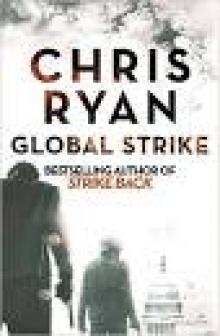 Global Strike
Global Strike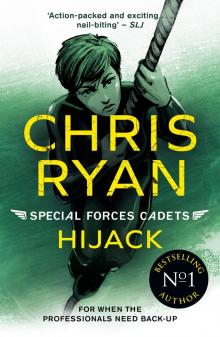 Hijack
Hijack Special Forces Cadets 2
Special Forces Cadets 2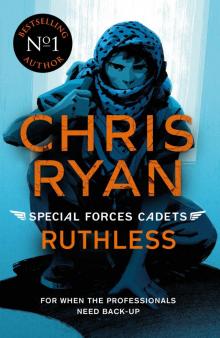 Ruthless
Ruthless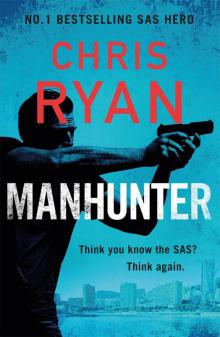 Manhunter
Manhunter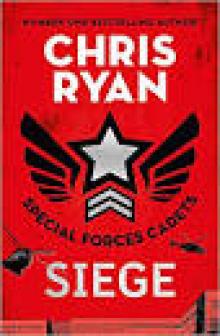 Special Forces Cadets 1
Special Forces Cadets 1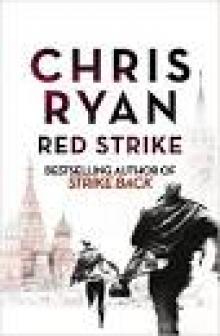 Red Strike
Red Strike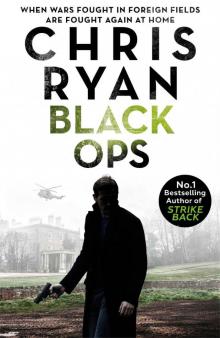 Black Ops
Black Ops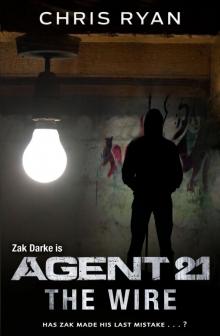 Agent 21: The Wire
Agent 21: The Wire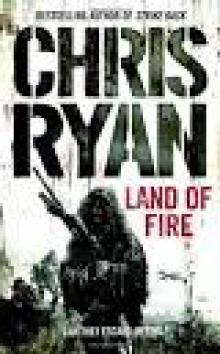 Land of Fire
Land of Fire Alpha Force: Fault Line
Alpha Force: Fault Line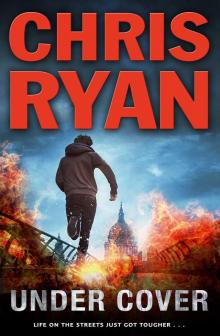 Under Cover (Agent 21)
Under Cover (Agent 21)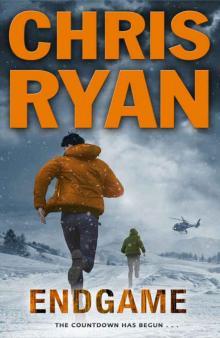 Endgame (Agent 21)
Endgame (Agent 21) Red Centre
Red Centre Blackout
Blackout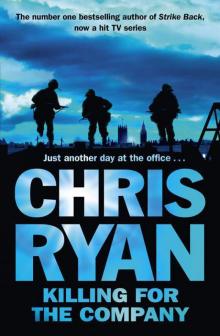 Killing for the Company
Killing for the Company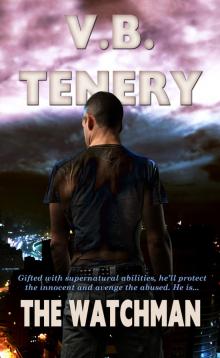 The Watchman
The Watchman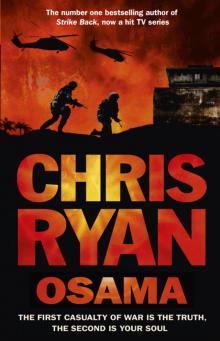 Osama
Osama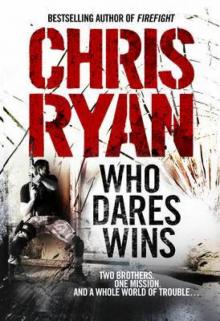 Who Dares Wins
Who Dares Wins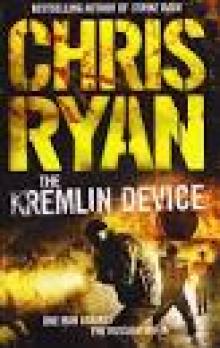 The Kremlin Device
The Kremlin Device Hunter Killer
Hunter Killer Alpha Force: Untouchable
Alpha Force: Untouchable Stand By Stand By
Stand By Stand By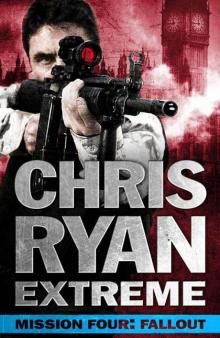 Chris Ryan Extreme: Hard Target: Mission Four: Fallout
Chris Ryan Extreme: Hard Target: Mission Four: Fallout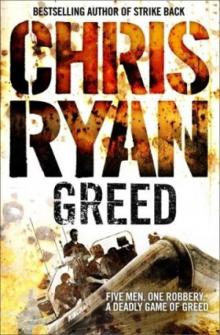 Greed mb-1
Greed mb-1 Alpha Force: Desert Pursuit
Alpha Force: Desert Pursuit Strike Back
Strike Back Greed
Greed The Bay Bulls Standoff
The Bay Bulls Standoff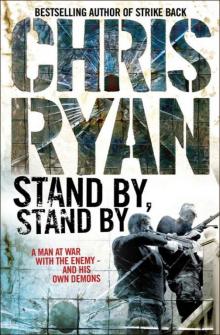 Stand By, Stand By gs-1
Stand By, Stand By gs-1 Outbreak
Outbreak Hunted
Hunted Vortex cr-4
Vortex cr-4 Rat-Catcher
Rat-Catcher Vortex
Vortex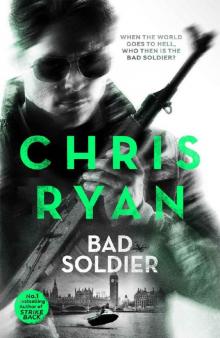 Bad Soldier
Bad Soldier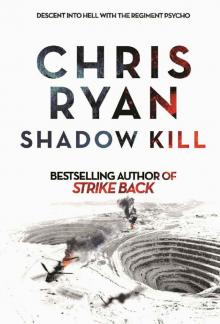 Shadow Kill: A Strikeback Novel
Shadow Kill: A Strikeback Novel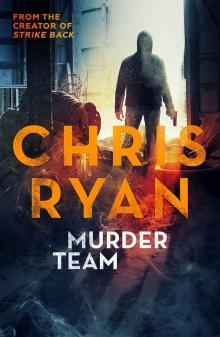 Murder Team (Kindle Single)
Murder Team (Kindle Single) One Good Turn
One Good Turn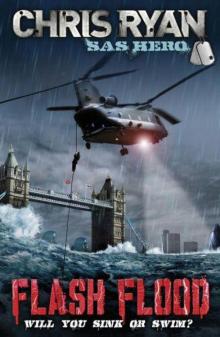 Flash Flood cr-1
Flash Flood cr-1 Night Strike
Night Strike Wildfire
Wildfire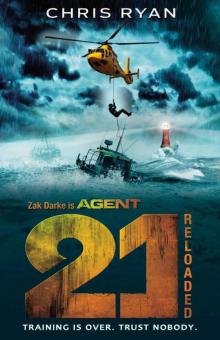 Agent 21: Reloaded: Book 2
Agent 21: Reloaded: Book 2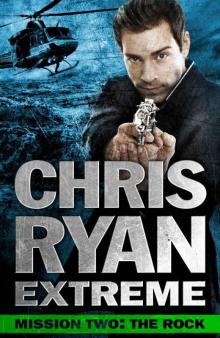 Chris Ryan Extreme: Hard Target: Mission Two: The Rock
Chris Ryan Extreme: Hard Target: Mission Two: The Rock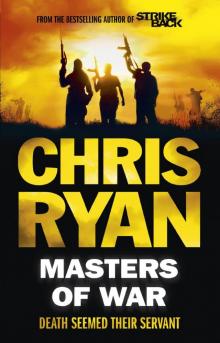 Masters of War
Masters of War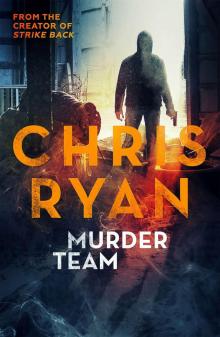 Murder Team
Murder Team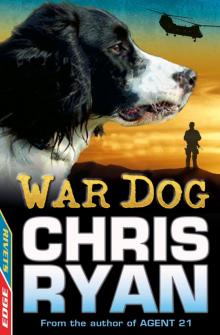 War Dog
War Dog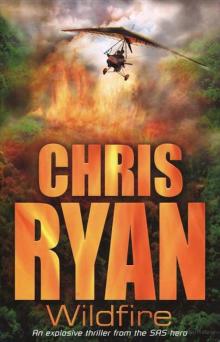 Wildfire cr-2
Wildfire cr-2 Survival
Survival The One That Got Away - Junior edition
The One That Got Away - Junior edition The Hit List
The Hit List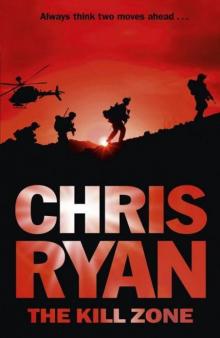 The Kill Zone
The Kill Zone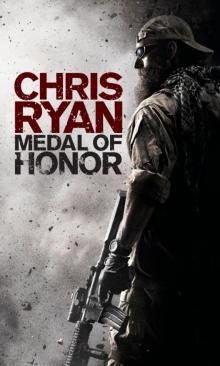 Medal of Honor
Medal of Honor Battleground
Battleground Twister
Twister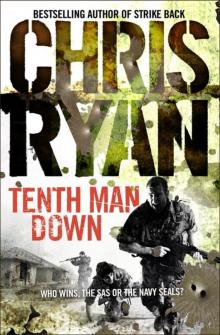 Tenth Man Down gs-4
Tenth Man Down gs-4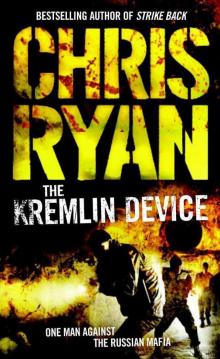 The Kremlin Device gs-3
The Kremlin Device gs-3 Hostage
Hostage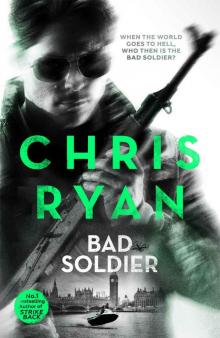 Bad Soldier: Danny Black Thriller 4
Bad Soldier: Danny Black Thriller 4 Alpha Force: Blood Money
Alpha Force: Blood Money Firefight
Firefight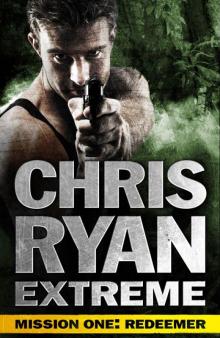 Chris Ryan Extreme: Hard Target: Mission One: Redeemer
Chris Ryan Extreme: Hard Target: Mission One: Redeemer Hit List
Hit List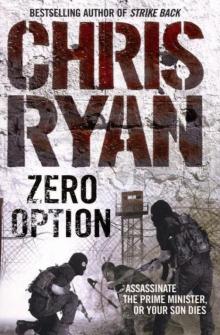 Zero Option gs-2
Zero Option gs-2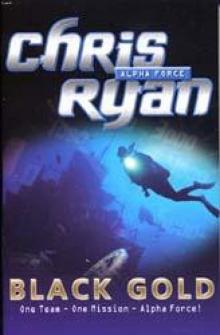 Black Gold
Black Gold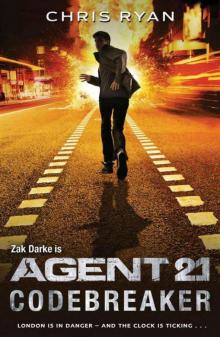 Agent 21: Codebreaker: Book 3
Agent 21: Codebreaker: Book 3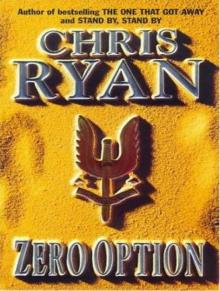 Zero Option
Zero Option Ultimate Weapon
Ultimate Weapon Tenth Man Down
Tenth Man Down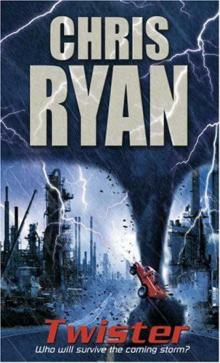 Twister cr-5
Twister cr-5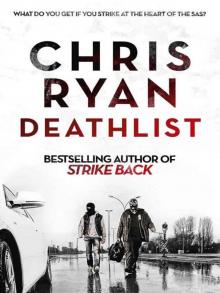 Deathlist
Deathlist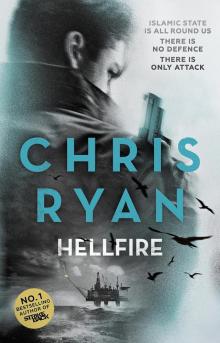 Hellfire
Hellfire Flash Flood
Flash Flood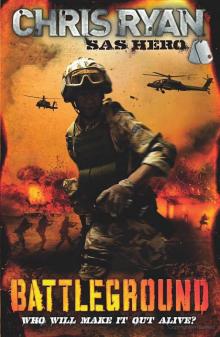 Battleground cr-6
Battleground cr-6 The Increment
The Increment